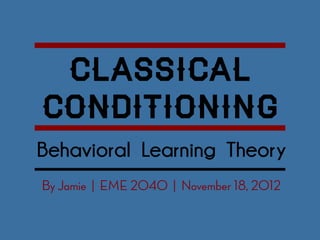
Classical Conditioning in the Classroom
- 2. Ivan Pavlov (1849-1936) Physiologist • Used “conditioning” to gain a predictable response from a stimulus • Famous for behavioral experiment with dogs John B. Watson (1878-1958): Psychologist • Key researcher of behaviorism • Famous for infant research and “Little Albert” experiment
- 3. Pavlov Dog Conditioning Pavlov presented food to dogs dogs’ mouths water Pavlov rang bell the dogs’ mouths did not water Conditioned Response Pavlov presented food to dogs and rang bell dogs’ mouths water Pavlov rang bell without food present dogs ‘mouths water
- 4. Watson’s Little Albert Before During Once Conditioning Conditioning conditioned When Albert was Baby “Albert” is When Albert tried presented with the allowed to play to pet or come rat again, he with a pet rat. near the rat, became scared, Watson would cried, and tried to Albert enjoys make a loud noise. move away from petting the rat and the rat. does not fear it. This scared Albert. This scaring when He had become Albert was scared conditioned into of loud noises. coming close situation was realizing that the repeated many white rat was times. related to the loud noise.
- 5. Main Points Classical conditioning deals with reflexes, or responses that are evoked from a specific stimulus People can be trained to perform a certain task or response by providing some sort of trigger, which may be a sound, picture, phrase, etc. When you see this: What do you think of? You’ve be conditioned to think of McDonalds after seeing this picture! (Are you salivating?)
- 6. Classroom Implications If the teacher is consistent and repetitive with these stimuli, eventually the students will come to learn to behave properly through classical conditioning. If the teacher… Then the students… Before conditioning Counts down from twenty Will not clean up. Tells the class to clean up Will clean up. During conditioning Tells the class to clean up Will clean up. and counts down from twenty After conditioning Counts down from twenty Will clean up. The students’ behavior has been conditioned!
- 7. Classroom Implications If the teacher is consistent and repetitive with these stimuli, eventually the students will come to learn to behave properly through classical conditioning. If the teacher… Then the students… Before conditioning Instructs the class to quiet down Will get quiet. Claps 3 times. Will not get quiet. During conditioning Claps 3 times and instructs the Will get quiet. class to quiet down. After conditioning Claps 3 times. Will get quiet. The students’ behavior has been conditioned!
- 8. Classroom Implications Technology can be used too to help students be classically conditioned! Music and computers are used here. If the teacher… Then the students… Before conditioning Plays the alphabet song Will not get setup up at computers. Instructs the students to go to their assigned computers Will get setup at computers. During conditioning Plays the alphabet song and Will get setup at computers. instructs students to go to their assigned computers. After conditioning Claps 3 times. Will get setup at computers. The students’ behavior has been conditioned!
- 9. Classroom Implications Technology can be used too to help students be classically conditioned! Calculators can help students learn through this behavioral method. If the teacher… Then the students… Before conditioning Wants students to learn Will not know answers. multiplication tables Use calculator to find answers Will be able to find answers. During conditioning Wants class to repeat using Will be able to find answers calculators to learn and slowly learn answers. multiplication tables After conditioning Wants students to learn Will no longer need multiplication tables calculators and will know answer. The students’ behavior has been conditioned!
- 10. Personal Applications In the classroom, I hope to use classical conditioning to teach my students expected behaviors for routine activities without having to daily tell them what I’m wanting. • Clapping 3 times to get class quiet • Counting down from twenty to get class to clean up • Have certain songs played representing where students should be (ie: “reading song” playing means go to reading corner) • Flashing the lights twice to get the class to return to their seats.
- 11. Credits & Citations • Biographical pictures from biography.com • All other images from Microsoft Office Collections • Cherry, Kendra. "Pavlov's Dogs: How Ivan Pavlov Discovered Classical Conditioning." 13 Nov. 2012. <http://psychology.about.com/od/classicalconditioning/a/pavlovs-dogs.htm>. • Cherry, Kendra. “John B. Watson’s Biography (1878-1958)." 13 Nov. 2012. <http://psychology.about.com/od/profilesofmajorthinkers/p/watson.htm> • Learning Theories Knowledgebase (2012, November). Classical Conditioning (Pavlov) at Learning-Theories.com. Retrieved November 15th, 2012 from http://www.learning-theories.com/classical-conditioning-pavlov.html • Shelly, Gary, Glenda Gunter, and Randolph Gunter. Teachers Discovering Computers: Integrating Technology in a Connected World, Seventh Edition. Page 258. Boston: Cengage Learning, 2012.